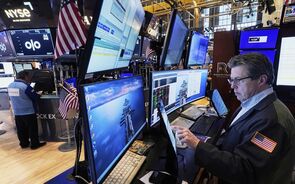Cramer- "Tech Could Start Looking Cheap Again"
2 mensagens
|Página 1 de 1
E aqui fica o comentário a este artigo do Cramer, por parte do Robert Mancini, outro dos analistas do Realmoney e que discorda do que escreveu Cramer:
Robert Marcin
Tech stocks
6/30/03 11:14 AM ET
"Jim, I have to respectfully disagree with your assertion that tech stocks could be cheap. I do a significant amount of turnaround investing. This requires calculating normalized revenues and margins for cyclically depressed businesses. Then I calculate valuations on those normalized numbers. Most stocks today trade for 30 or 40 times normalized earnings. This seems awfully high for a set of industries with significant problems.
In my opinion, there will be a significant secular revaluation to the downside for the sector once investors really understand the nature of the business and the bubble.
Most industries in the tech sector are ferociously competitive. There exists gross overcapacity in virtually every category. The business suffers from a "winner-take-all" syndrome where number 2,3,or 4 players do not earn their cost of capital, nor do they maintain much takeover value because of compatability issues. Technological obsolescence is a very high risk, whereby a dominant franchise could implode in a few short years.
Growth rates for the sector are grossly overstated. I did a study that demonstrated the sector had grown revenues 10% on a secular basis for the entire industry. I think the number is closer to nominal GDP(5-6%) today as it has become a very large part of the economy. Margins are highly cyclical as well, which should reduce valuations.
So what is the proper valuation for a highly cyclical, hypercompetitive, loser-worth-nothing sector? It's a lot lower than where the stocks trade today.
I will grant that some mega cap tech shares appear reasonably priced if you mark up profits in a big way. Few, however, are cheap. Your beloved Intel might make $1 per share next year; it may also earn $.70. Either way it is not "cheap" in the sense that I use the word. Most other tech stocks trade at higher p/e's than Intel after normalizing profits.
In the mid 90's I owned tech companies like Intc, Emc, Ca, Sunw, Txn, Hwp, and Ibm at fractions of sales and single digit price-earnings ratios. That was cheap! My guess is that investors will be disappointed over tech fundamentals for a long time and valuations will recede to market multiples or even discounts as investors grasp the slower growth, more cyclical margins, and higher risk of the sector. "
(in www.realmoney.com)
Robert Marcin
Tech stocks
6/30/03 11:14 AM ET
"Jim, I have to respectfully disagree with your assertion that tech stocks could be cheap. I do a significant amount of turnaround investing. This requires calculating normalized revenues and margins for cyclically depressed businesses. Then I calculate valuations on those normalized numbers. Most stocks today trade for 30 or 40 times normalized earnings. This seems awfully high for a set of industries with significant problems.
In my opinion, there will be a significant secular revaluation to the downside for the sector once investors really understand the nature of the business and the bubble.
Most industries in the tech sector are ferociously competitive. There exists gross overcapacity in virtually every category. The business suffers from a "winner-take-all" syndrome where number 2,3,or 4 players do not earn their cost of capital, nor do they maintain much takeover value because of compatability issues. Technological obsolescence is a very high risk, whereby a dominant franchise could implode in a few short years.
Growth rates for the sector are grossly overstated. I did a study that demonstrated the sector had grown revenues 10% on a secular basis for the entire industry. I think the number is closer to nominal GDP(5-6%) today as it has become a very large part of the economy. Margins are highly cyclical as well, which should reduce valuations.
So what is the proper valuation for a highly cyclical, hypercompetitive, loser-worth-nothing sector? It's a lot lower than where the stocks trade today.
I will grant that some mega cap tech shares appear reasonably priced if you mark up profits in a big way. Few, however, are cheap. Your beloved Intel might make $1 per share next year; it may also earn $.70. Either way it is not "cheap" in the sense that I use the word. Most other tech stocks trade at higher p/e's than Intel after normalizing profits.
In the mid 90's I owned tech companies like Intc, Emc, Ca, Sunw, Txn, Hwp, and Ibm at fractions of sales and single digit price-earnings ratios. That was cheap! My guess is that investors will be disappointed over tech fundamentals for a long time and valuations will recede to market multiples or even discounts as investors grasp the slower growth, more cyclical margins, and higher risk of the sector. "
(in www.realmoney.com)
Cramer- "Tech Could Start Looking Cheap Again"
"Tech Could Start Looking Cheap Again"
By James J. Cramer
06/30/2003 09:49 AM EDT
"Here's something to think about. Tech's going pretty well without the economy doing well. What happens if things catch on fire?
Let's take the case of Intel. I continue to think that Intel is doing quite well in this environment and that the consensus for Intel is too low. It may be way too low. I am not as bullish as Tom Kurlak, who thinks Intel could earn $1.20 next year. I remain at the controversial $1 level, well above consensus and hugely above what my friend Bill Fleckenstein thinks it can earn. I also think it can pay a much bigger dividend.
I feel the same way, dividend-wise, about Microsoft and Cisco. Neither company is setting the world on fire, but it's not like these companies are losing money. In fact, given that they all have weak-dollar winds at their backs and that business hasn't gotten worse, I wonder if they, too, might be earning more than people expect.
I own Hewlett-Packard in part because I believe estimates are too low for that giant company. And it wouldn't surprise me if the numbers for IBM -- again, a weak-dollar beneficiary -- were too low.
Meanwhile, the stocks basically have done very little. Intel's up nicely from the bottom, but the others haven't shown much. As we turn the page -- don't forget that next week we will stop caring about 2003's numbers and be focusing on 2004's -- I think you will be staring at a bunch of stocks that will seem downright cheap, given where interest rates are.
On my radio show, RealMoney With Jim Cramer, we play a game on Wednesdays called "Am I Diversified?" I used to dread the game because everyone owned tech, tech and more tech. Now when we play, it is amazing. Unless someone is from Seattle, where Microsoft is most definitely overowned, nobody seems to have any tech at all. That's extraordinary: an underweighted group in which the earnings might come through that everybody's afraid to have much exposure to because of the past and because of the traditional summer slowdown.
What can I say? I know the Nazz is up big this year so far. I know that most people now think tech is overvalued. I don't see it that way.
Especially if these companies embrace the religion that Bank of America and Goldman Sachs showed, and Citigroup will show on dividends. These companies, above all others, can pay real whoppers. If they want to get their stocks up, they better start doing so. "
(in www.realmoney.com
By James J. Cramer
06/30/2003 09:49 AM EDT
"Here's something to think about. Tech's going pretty well without the economy doing well. What happens if things catch on fire?
Let's take the case of Intel. I continue to think that Intel is doing quite well in this environment and that the consensus for Intel is too low. It may be way too low. I am not as bullish as Tom Kurlak, who thinks Intel could earn $1.20 next year. I remain at the controversial $1 level, well above consensus and hugely above what my friend Bill Fleckenstein thinks it can earn. I also think it can pay a much bigger dividend.
I feel the same way, dividend-wise, about Microsoft and Cisco. Neither company is setting the world on fire, but it's not like these companies are losing money. In fact, given that they all have weak-dollar winds at their backs and that business hasn't gotten worse, I wonder if they, too, might be earning more than people expect.
I own Hewlett-Packard in part because I believe estimates are too low for that giant company. And it wouldn't surprise me if the numbers for IBM -- again, a weak-dollar beneficiary -- were too low.
Meanwhile, the stocks basically have done very little. Intel's up nicely from the bottom, but the others haven't shown much. As we turn the page -- don't forget that next week we will stop caring about 2003's numbers and be focusing on 2004's -- I think you will be staring at a bunch of stocks that will seem downright cheap, given where interest rates are.
On my radio show, RealMoney With Jim Cramer, we play a game on Wednesdays called "Am I Diversified?" I used to dread the game because everyone owned tech, tech and more tech. Now when we play, it is amazing. Unless someone is from Seattle, where Microsoft is most definitely overowned, nobody seems to have any tech at all. That's extraordinary: an underweighted group in which the earnings might come through that everybody's afraid to have much exposure to because of the past and because of the traditional summer slowdown.
What can I say? I know the Nazz is up big this year so far. I know that most people now think tech is overvalued. I don't see it that way.
Especially if these companies embrace the religion that Bank of America and Goldman Sachs showed, and Citigroup will show on dividends. These companies, above all others, can pay real whoppers. If they want to get their stocks up, they better start doing so. "
(in www.realmoney.com
2 mensagens
|Página 1 de 1
Quem está ligado:
Utilizadores a ver este Fórum: Bing [Bot], PAULOJOAO e 86 visitantes



